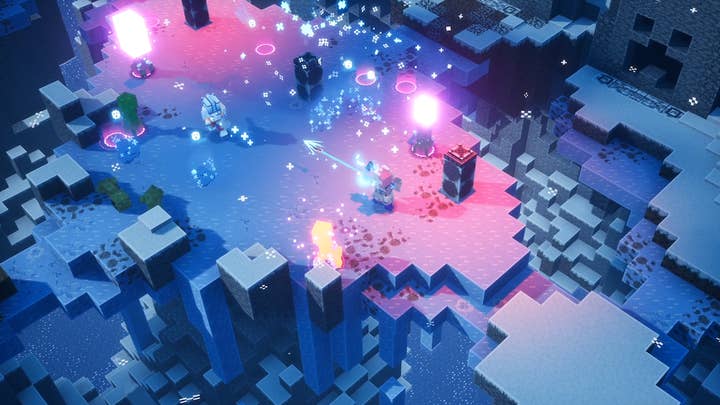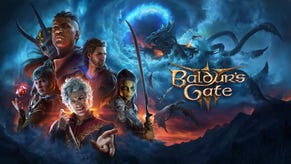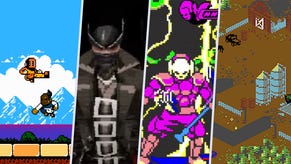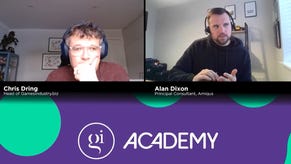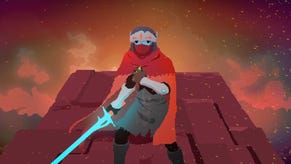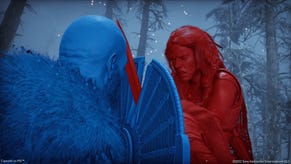Four ways to improve your collaboration with another studio
Having taken the helm on Minecraft Dungeons' DLC, Double Eleven shares how to make the best of a multi-studio collaboration
Double Eleven is mostly known for porting games to consoles, working on such titles as Limbo, LittleBigPlanet, the PixelJunk series, and Goat Simulator.
Four years ago, we brought Prison Architect to console and started developing original content for the franchise. This coincided with the work we did to support the development of Crackdown 3. Microsoft saw what we could offer, opening up the opportunity to co-develop Minecraft Dungeons and our most ambitious development duty yet, with the creation of its Jungle Awakens and Creeping Winter expansions.
When it comes to ports, there's a huge host of small scale creative challenges that come with optimizing for different hardware, control schemes and UI, to ultimately make the game suitable for a platform's playerbase. Creating entirely original content utilises a lot of the same skills, but offers a greater degree of creative freedom. With that freedom comes great creative responsibility, especially when you're helming the expansion of one of the world's most popular franchises.
Thankfully, Mojang Studios did an exceptional job of collaborating with us to make this as smooth a transition as possible, and we'd like to offer some of our key takeaways about how this process was handled.
Trust your collaborators with your studio's secrets
First off: trust is vital. Mojang didn't simply cast down orders from on high, but rather gave us full creative control over these expansions. It was clear from the beginning that this was going to be more of a partnership than one studio outsourcing to another.
They trusted us with their IP, letting us peek behind the curtain, rather than only showing us the tip of the iceberg and asking us to work with that. Of course Mojang offered us guidance here and there on how things should look or feel to stay true to the brand overall. This was great for morale, as we felt like we were given a chance to really shape the future of this colossal brand in ways we'd never experienced before.
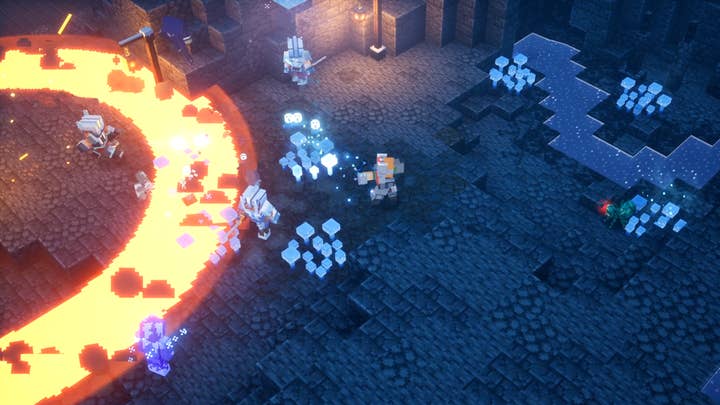
When brainstorming ideas we'd look at the original Minecraft as a launching point, trying to imagine what kind of stories could have taken place here, and how the terrain would affect how those stories play out. We'd then pitch them to Mojang and they'd tell us what they're most excited about and we'd build upon that, constantly going back and forth, refining with each iteration, until launch.
You hear plenty of horror stories about studios getting contracted out to make a game's DLC or a multiplayer mode, and these often end up feeling at odds with the rest of the game because of communication breakdowns with the outsourced team.
It can be a herculean effort just to make sure one studio is all on the same page. Getting a second studio to also be in sync with the primary developer can be a logistical nightmare. That wasn't the case here at all, as Mojang treated us more like co-developers or partners, ensuring that we were always on the same page.
Don't dally on bringing your collaborators into the fold
Another key takeaway is to start your collaborations early. We started building Jungle Awakens and Creeping Winter midway through the parent game's development. From a code perspective, it can be very difficult doing anything with a game once it has shipped. And from a creative perspective, by starting when we did we had the benefit of seeing what the base game was doing in the final levels.
We needed the time to make mistakes, to be way off base and start again from scratch
Right from the start, Mojang Studios was able to guide us on what they felt were the stronger points of the game as a whole, which we could then focus on when creating the expansions. We could process this information, spend time coming up with ideas and then pitch them to Mojang. This process benefited heavily from onboarding us early.
It can sound cliché, but there are so many overarching themes, lore, and nuance that go into creating something new within a beloved brand that we needed the time to make mistakes, to be way off base and start again from scratch. This meant that not only would we make one expansion pack, but that we would have enough of an understanding of this crazy smorgasbord of ideas that we could continue to make multiple expansions in a shorter amount of time, meaning Minecraft Dungeons could meet the live service title expectations of the Minecraft brand.
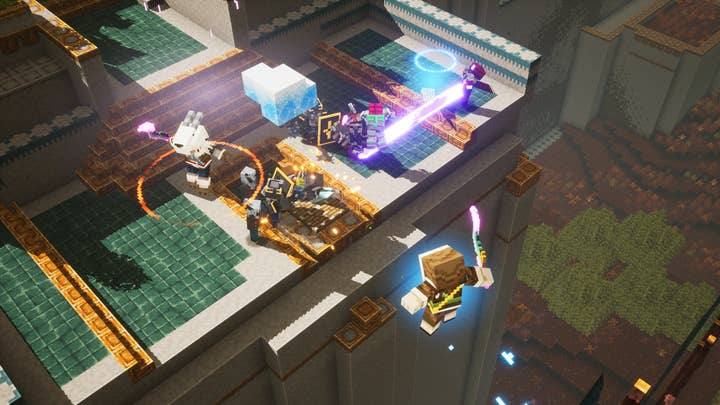
Face-to-face interactions are vital to team building
Another thing that helped immeasurably in facilitating this collaboration was being able to meet the team at Mojang face to face (back when you could meet people face to face) to get an understanding of their creative vision and how they wished for Minecraft Dungeons to be a faithful representation of the Minecraft brand.
During the initial stage of our collaboration we also spent time on team building exercises and Fika, the Swedish tradition of taking a break during the day to socialise with your colleagues over coffee and cake. There is so much to be gained by just visiting a studio, putting names to faces, and understanding the environment and workplace culture.
I can't even begin to count the number of times where a message has been received, context has been lost, and the recipient has become upset or stressed because of it. It's easily done and people tend to take it hardest when the subject of the critique is something creative that they've poured their heart and soul into.
In these times, where many of us are feeling very isolated, we all need those personal moments where we can bond
This can be exacerbated even further by the fact that when working on another developer's property, our good friend imposter syndrome will regularly set up shop at the back of your mind for the duration of the project. However, these instances are greatly reduced when you've met the person sending the message, when you've had chats over coffee about hobbies, your families, or a deep-seated hatred of American blueberries.
So when you eventually get some constructive criticism, rather than focus on the worries about what you did wrong, you'll understand that we're all friends here. This makes it easier to respond in good faith, not take it personally, and move on stress-free.
Sadly this has become more difficult in the age of COVID-19, so virtual meetings have had to step up to prevent the loss of that vital nonverbal communication. In these times, where many of us are feeling very isolated, we all need those personal moments where we can bond. We'd suggest making Virtual Fika a regular practice!
A team that stays together slays together
One reason Mojang trusted us so much was because we've shipped many a title with extremely low staff turnover, so the vast majority of our team are not just experienced developers, but experienced developers with a history of working together. While there are no shortcuts to building an impressive portfolio (so newer studios will just have to grow their pedigree over time), low turnover is something that other studios can start to address immediately.
Double Eleven accumulated so much knowledge by putting employees' wellbeing at the forefront of our studio's values. Once someone starts at Double Eleven, they tend to stay for a good, long while.
In fact, one of the team building exercises we did when we first collaborated with Mojang was to make everyone stand in a line in order of most titles shipped. The front of the line firmly consisted of Double Eleven staff. It's reassuring to a partner to know that so many of your staff have shipped so many titles as a team, sticking together throughout the entire odyssey.
Developing an expansion to someone else's game -- and one that's part of a blockbuster franchise at that -- was equal parts exciting and daunting. By bringing us in early, trusting us wholeheartedly, relying on our expertise, and inviting us to the studio to share their company culture with us, we became part of the team. We think this more intimate fraternisation came through in the work, to the point that players who don't follow game development wouldn't notice that the expansions are developed by a different studio.
Tom Pedalino is senior designer at Double Eleven. He has been in the industry for ten years working on a wide variety of titles like LittleBigPlanet Vita and Minecraft Dungeons to indie hits like Songbringer and Prison Architect.
